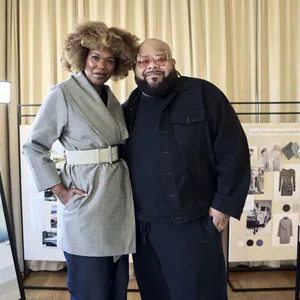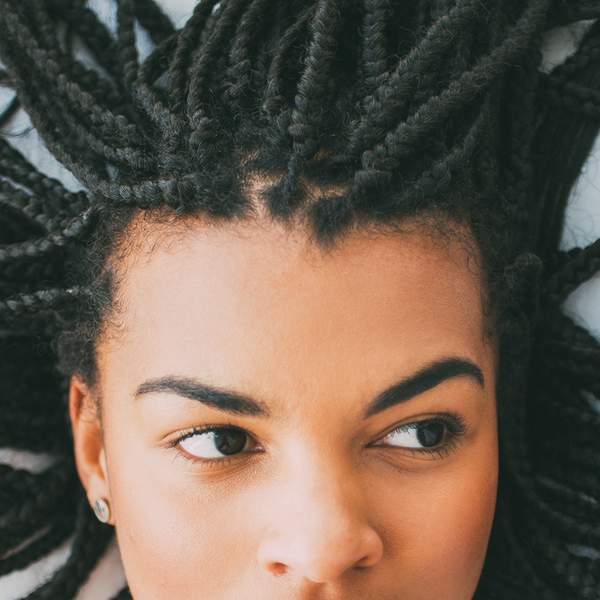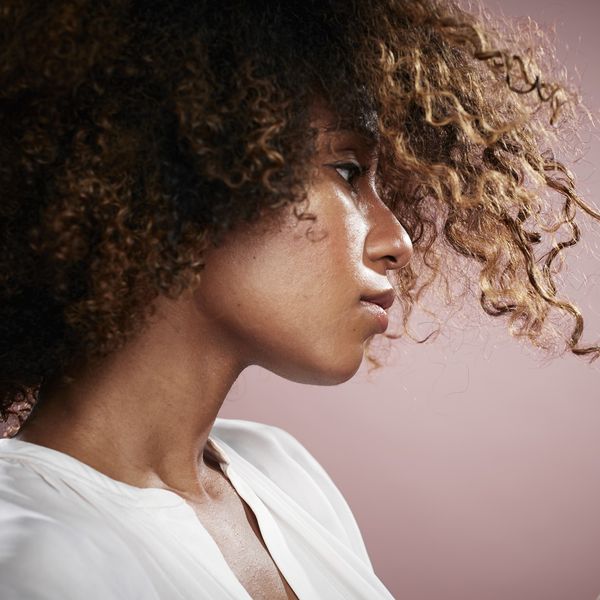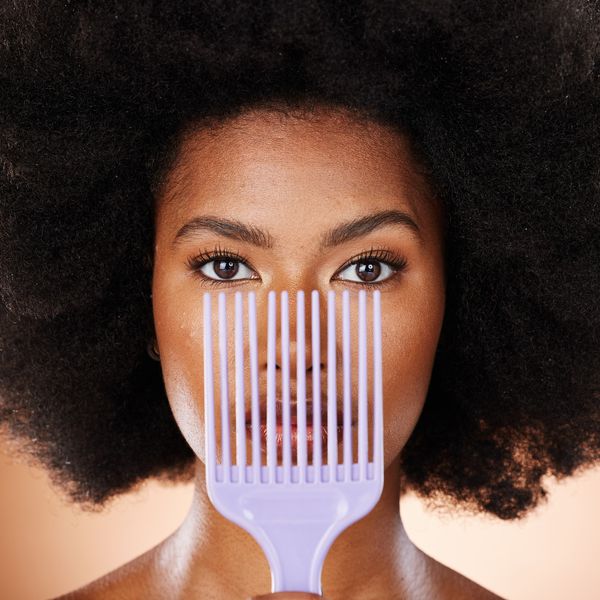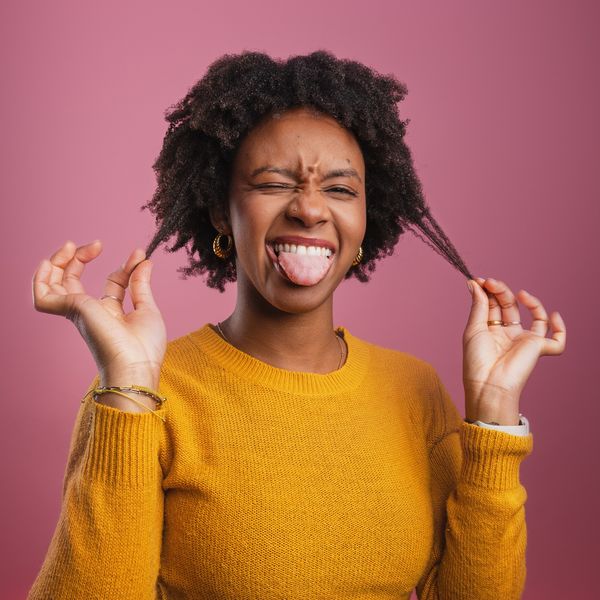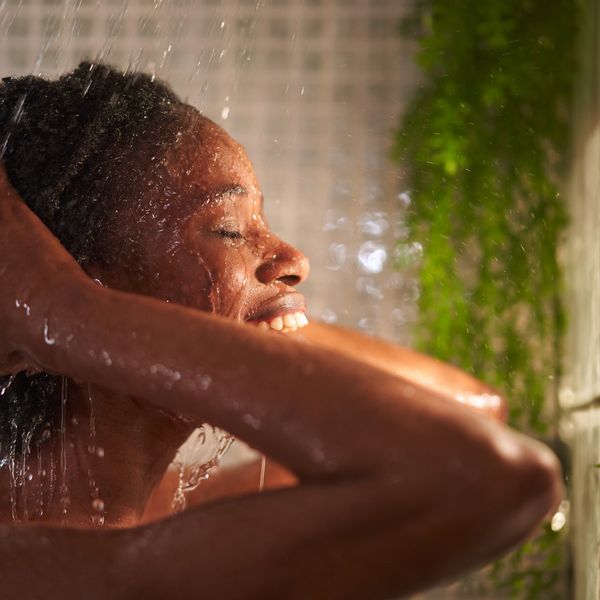As I've been on this journey to grow out my natural hair, something that I've been learning to pay more attention to is my scalp. After all, it's the foundation for my tresses, so if it's not in good shape, my hair won't be. And as I've been discovering how to give it the TLC that it deserves, a practice that I've been putting into play more and more is scalp detoxing. If you're already deep sighing at the mere thought of having something else to put on your to-do list, you can stop. I promise you that it's a really easy thing to do. Plus, the way your scalp will feel immediately after you do it makes making the time totally worth your while.
So whether you like to use lots of hair products, you've got a chemically-treated or sensitive scalp, or you want to get rid of dandruff or dead skin flakes, this article will easily break down just why scalp detoxing is the route to take, along with the steps that you can implement, as soon as this weekend.
Why You Should Detox Your Scalp

I recently read an article that said what we purchase beauty products at a rate that is a whopping nine times greater than white women do. The reason why that is nothing to "Kanye shrug" about is because if those products contain toxic ingredients, including hormone disruptors like parabens and phthalates, that's a big problem.
Especially since our skin has a tendency to absorb 60 percent of what we put on it, within 26 seconds of putting it on. Not only that but get this—our scalp and forehead absorb chemicals about four times faster than our forearms do. If you let that, pardon the pun, penetrate, how could you not want to detox your scalp once a month?
Especially if you add along with all of this the fact that the chance for product build-up which could lead to clogged hair follicles, an itchy irritated scalp and stunted hair growth.
In a nutshell, detoxing your scalp can help to remove leftover toxins that are sitting on it; it can also help to rebalance your scalp so that your hair is better able to thrive. So yeah, there is simply no reason why it's not a good thing to do on a consistent basis.
5 Different Scalp Detox Methods to Try
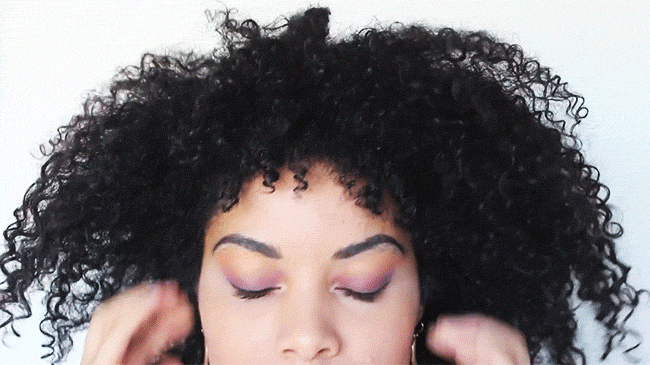
Now that you know why you should do a little scalp detoxing, you might wonder, just how you should go about doing it. I've got a few ideas.
If you want to remove product build-up. If you use any sort of product on your hair, some sort of build-up is sure to follow. One way to get a handle on all of that is to mix two tablespoons of baking soda with one cup of lukewarm distilled water. After shampooing your hair, apply the mixture and gently massage your scalp. Allow the solution to remain for 10 minutes, then rinse thoroughly and condition your hair.
If you want to treat dandruff or any fungi growth. It really can't be said enough that dandruff and dry scalp are not the same thing. Dandruff is the result of an overgrowth of a yeast known as Malassezia. Something that you can do to better manage dandruff is to detox your scalp with the help of some grapeseed oil and cinnamon powder. As the grapeseed oil works to fight off free radicals, the antiviral, antifungal and antibacterial compounds in the cinnamon powder will help to prevent fungal and bacterial infections. Mix two tablespoons of grapeseed oil with a teaspoon of cinnamon powder to clean damp hair. Massage it onto your scalp, let it sit for 20 minutes, then rinse.
If you want to repair any skin cells that you may have. Something that you can do to help restore any dead skin cells that may be on your scalp is to apply some pure Aloe vera gel to it. The proteolytic enzymes will soothe and repair the cells while other properties of the gel with help to deep condition your scalp. Simply apply 1-2 tablespoons on freshly washed damp hair. Let it sit for 30 minutes and then rinse and style as usual.
If you've got relaxed or color-treated hair. If you want to detox your scalp after a chemical treatment, an oil-based detox can prevent your scalp from drying out. Mix a tablespoon of olive oil (it deeply moisturizes), a teaspoon of jojoba (it soothes an irritated scalp) and 3-5 drops of peppermint oil (it kills germs and increases blood circulation) together. Apply the oil to freshly washed hair and massage your scalp. The menthol from the peppermint will provide an immediate tingling sensation that will soothe your scalp as the detox oils cleanse and heals your scalp simultaneously. Let it sit for 20 minutes, then thoroughly rinse and style as usual.
If you want to rejuvenate your scalp. Do you feel like your scalp could use a bit of a pick-me-up? One way to do just that is to combine a half cup of bentonite clay with a tablespoon of apple cider vinegar, a fourth cup of distilled water and 3-5 drops of lavender oil. The properties of the clay will help to purge any impurities from your scalp while the vinegar serves as an anti-inflammatory agent. As a bonus, lavender oil is antimicrobial, plus it helps to promote healthy hair growth. Apply this combination all over your scalp (and hair) right after washing it. Let it sit for 45 minutes, then rinse thoroughly with warm water. Then follow that up with a deep conditioning treatment and style as usual.
How to Maintain Your Scalp in Between Detoxes

Trust me when I tell you that, if you get into the habit of detoxing your scalp on a monthly basis, you are already going to be way ahead of the game when it comes to scalp care. But if you'd like a few more tips on how to keep your scalp in great condition, even between detoxing, here are some other things you should do.
Massage your scalp a couple of times a week. A good scalp massage is not only a wonderful way to relieve any stress that you may have, it can also increase blood flow to your scalp so that your hair is able to grow healthy and strong. You can massage your scalp with your fingers or with a portable scalp massager. A couple of years ago, Naptural85 did a pretty thorough video on the best ones for natural hair. You can check out here reviews here.
Cleanse on a bi-weekly basis. A clean scalp is a healthy scalp; that's why it's important to wash yours no less than a couple of times a month. The kind of shampoo that you use is gonna vary, based on what your scalp's specific needs are, but a shampoo that is paraben- and sulfate-free is wise. I'm a fan of shampoo bars myself. Black soap, specifically, is the complete and total truth.
Rinse with lukewarm water. Hot water might feel really good, but it can also dry out your scalp too. So, on wash day, avoid the "hot as you can bear it" approach. Lukewarm is far better and healthier overall.
Wash your hair care tools. Dirty combs and brushes are not only gross, they can irritate your scalp. That's why you need to make sure to wash them with a mild shampoo, no less than a couple of times each month.
Limit the amount of chemical treatments that you use. Oh, I love a head of jet black hair more than most, but I've come to accept that it's not healthy (plus, permanent hair dye tends to do the health and well-being of my hair more harm than good in the long run). And with articles on hair chemicals warning us of things like "permanent hair dye increases a black woman's risk of breast cancer by 45%", you are doing yourself a real favor by laying off of as many chemical treatments as possible. (Oh the dye tip, go with henna or at least a semi-permanent option; it's easier on your hair and better for your health.)
Keep your scalp moisturized. Sometimes our scalp is "mad at us" simply because it is super dry. You can make this less of an issue for you if you drink lots of water, eat plenty of fresh fruits and veggies, tie your hair up at night (so that your bedding doesn't strip your hair of its natural oils)—oh, and if you take a B-complex vitamin. Why B-complex? Because, believe it or not, there is a direct correlation between dry scalp and us not having enough of vitamins B6 and B12 in our system. By upping the B and lowering your sugar intake (which can dry out your scalp), you will be on your way to a great-feeling scalp and, ultimately, a healthy head of hair too!
Our scalp doesn't get seen much, so it gets ignored fairly often. But I am a living testament to the fact that if you take care of your scalp, your hair will truly flourish. Your health ultimately will too. Get to detoxing. It's a total game-changer!
Want more stories like this? Sign up for our newsletter here and check out the related reads below:
This Is Why Your Natural Hair Ain't Growin'
Looking For Hair Growth? It Might Be Time To Bring 'Blue Magic' Back
The Ugly Truth: Here's What Detox Teas Are Really Doing To Your Body
Feature image by Shutterstock
- Why Won't My Natural Hair Grow? - xoNecole: Women's Interest, Love, Wellness, Beauty ›
- Best Drinks For Healthy Hair Growth - xoNecole: Women's Interest, Love, Wellness, Beauty ›
- What Is Dandruff? - xoNecole: Women's Interest, Love, Wellness, Beauty ›
- How To Stop Dandruff In Natural Hair - xoNecole: Women's Interest, Love, Wellness, Beauty ›
- 7 Ways To Detox Your Scalp: Grow Thick and Healthy Hair - hair ... ›
- 6 Signs You Need a Scalp Detox Treatment - Simply Organic Beauty ›
- Why You Should Treat Your Scalp to a Detox ›
- Do Scalp Detox Treatments Work? The Answer May Surprise You ›
- Scalp Detox Treatment at Home - How to Deep Clean Your Scalp ›
- How to Detox Your Scalp - YouTube ›
- Detox your scalp for healthier hair ›
- How To Detox Your Scalp For Fast Hair Growth | DIY Scalp Detox ... ›
- Hair Detox: 8 Methods to Stay Natural, Scalp Care, and More ›
- How to Detox Your Scalp for Healthier Hair - The New York Times ›


